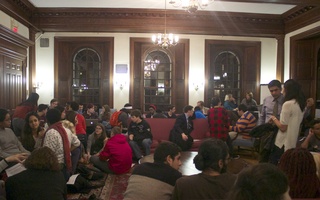His trial concluded only last month, but Owen Labrie—the St. Paul’s School graduate who was planning on joining the College’s Class of 2018 before he was accused of sexual assault and faced heavy scrutiny in the media—has not been enrolled at Harvard since last year. {shortcode-f4d07d084a235fecf0296ae4051a8e1a89f60bea}
The 19-year-old, accused of raping a then-15-year-old girl during his final year at the prestigious New Hampshire boarding school while participating in a tradition known as the “senior salute,” was found guilty of multiple misdemeanors and one felony charge of using the internet to solicit a minor, but was acquitted of aggravated felonious sexual assault. He faces a maximum sentence of 11 years and will have to register as a sex offender.
Although Harvard has declined to confirm that it revoked Labrie’s admission to the College—he could have withdrawn after the allegations surfaced, and his lawyer did not respond to requests for comment—legal experts say that rescinding his offer to come to campus is well within Harvard’s rights.
It is also not without precedent. In 2003, the College revoked its admission of controversial admit Blair Hornstine following charges that she had plagiarised articles she had written for her local newspaper. Hornstine notoriously sued her school district to ensure that she would be its sole valedictorian.
More recently, in late 2013, then-sophomore Eldo Kim emailed hoax bomb threats to Harvard officials during the College’s exam period, prompting the shutdown of three academic buildings and Thayer Hall. Kim, who is no longer enrolled at the College, has agreed to complete an 18-month deferred prosecution agreement, but it is uncertain whether he will be allowed to return to Harvard to complete his studies.
Harvard has declined to comment specifically on Labrie’s case, but released a statement defending the College’s right to revoke the admission of incoming students.
“Harvard College reserves the right to withdraw an offer of admission under certain conditions, which are clearly expressed to students upon their acceptance,” Faculty of Arts and Sciences spokesperson Rachael Dane wrote in a statement. “An offer of admission may be rescinded if a student engages in behavior that brings into question his or her honesty, maturity, or moral character.”
Dean of Admissions and Financial Aid William R. Fitzsimmons ’67 declined to comment.
Legal experts agree with Harvard’s stance. Harvey A. Silverglate, a longtime Cambridge lawyer who has advised Harvard students facing Administrative Board investigations, said private schools are entitled to write their own disciplinary codes and are not bound by the norms of the federal justice system.
“Innocent until proven guilty is a concept and standard within the criminal justice system and does not restrict a private school unless that school has voluntarily bound itself to such a high and exacting standard of fairness,” Silverglate wrote in an email.
But while experts and Harvard agree that the University may rescind an admissions offer to incoming students when it so pleases, administrators still must weigh the need to keep their campus safe and the possibility of a student’s innocence when deciding whether to revoke an admissions offer, according to experts. Harvard’s decision to rescind a student is final, according to a University official, but people charged with crimes are not always found guilty.
Labrie, for example, had not yet been convicted of a crime when he was scheduled to come to Cambridge.
He was no longer enrolled at Harvard by September 2014, even though his trial did not commence until this summer. Laura Bennett, the president of the Association for Student Conduct Administration, attributed that arrangement partly to the seriousness of the charges he faced. Because anti-sex discrimination law Title IX requires colleges to protect its students from sexual violence, she said, “the campus process can often happen more quickly than a criminal process does.”
Peter F. Lake ’81, a professor at Stetson University College of Law who specializes in higher education law, said the novelty of cases like Labrie’s and Kim’s means that decisions to revoke or expel students are frequently made on an individualized basis.
“You have to make some pretty educated guesses about whether this individual does or does not pose an ongoing threat to your community,” he said. “Each situation is unique.”
—Staff writer Daphne C. Thompson can be reached at daphne.thompson@thecrimson.com. Follow her on Twitter @daphnectho.
Read more in College News
UC Leaders Seek To ‘Institutionalize’ Projects This SemesterRecommended Articles
-
Calendar.Harvard Philosophical Club. Ethics and Culture. Address by Professor Felix Adler of New York. Sanders Theatre, 8 p.m. Admission by
-
Harvard Philosophical Club.Professor A. Loisette, will lecture under the auspices of the Harvard Philosophical Club, Monday, April 18, in Sanders' Theatre, at
-
Faculty Action.As a recent meeting or the Faculty it was voted, that WHEREAS, up to the present time all students have
-
Amid Controversy, HLS Students to Recognize New York Public DefenderFollowing controversy surrounding two Law School student groups’ recent decision to revoke an honor from Robin Steinberg, a New York City public defender, other students have begun planning to bring Steinberg to campus anyway.
-
 Harvard Today: December 11, 2015
Harvard Today: December 11, 2015













